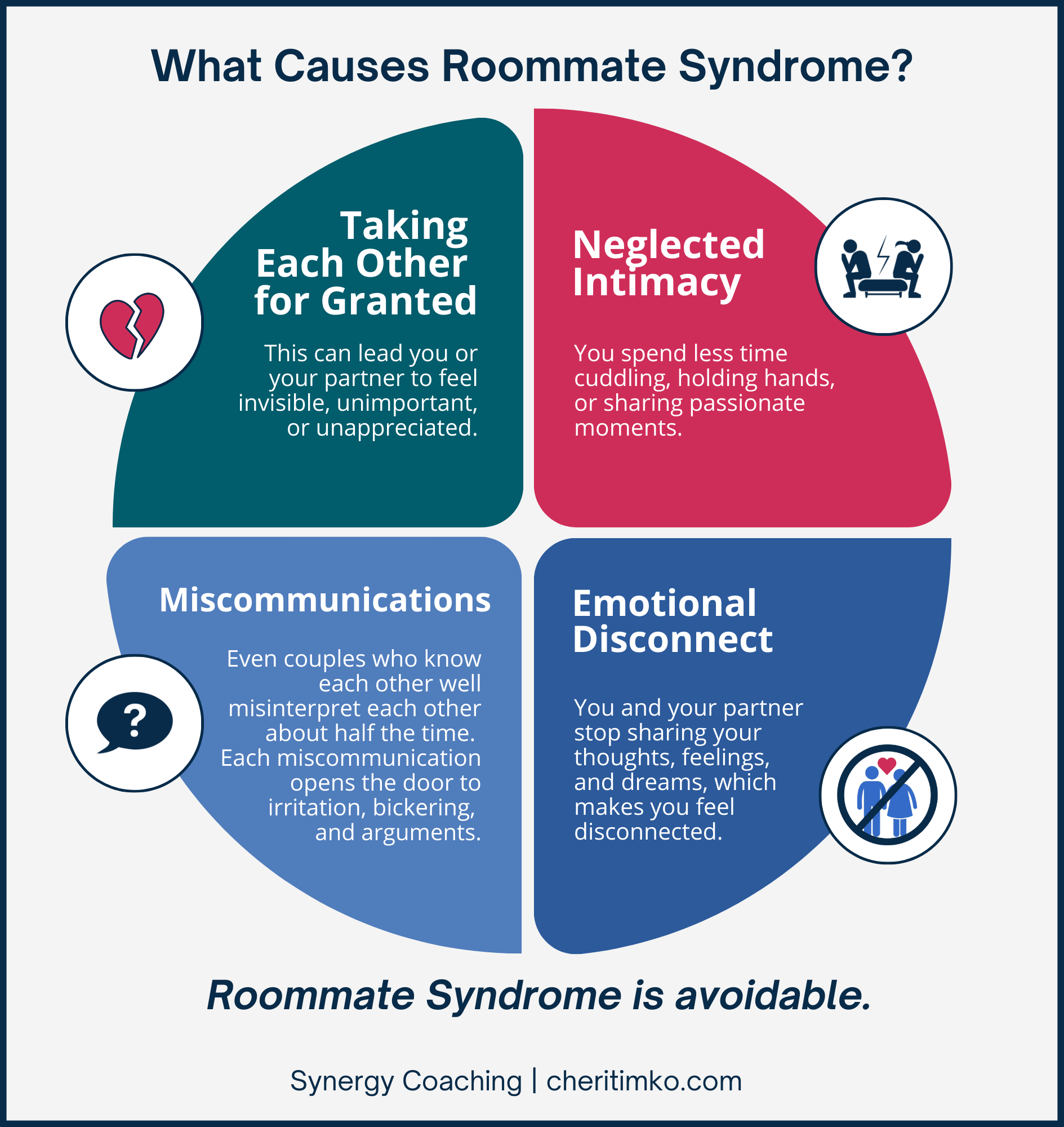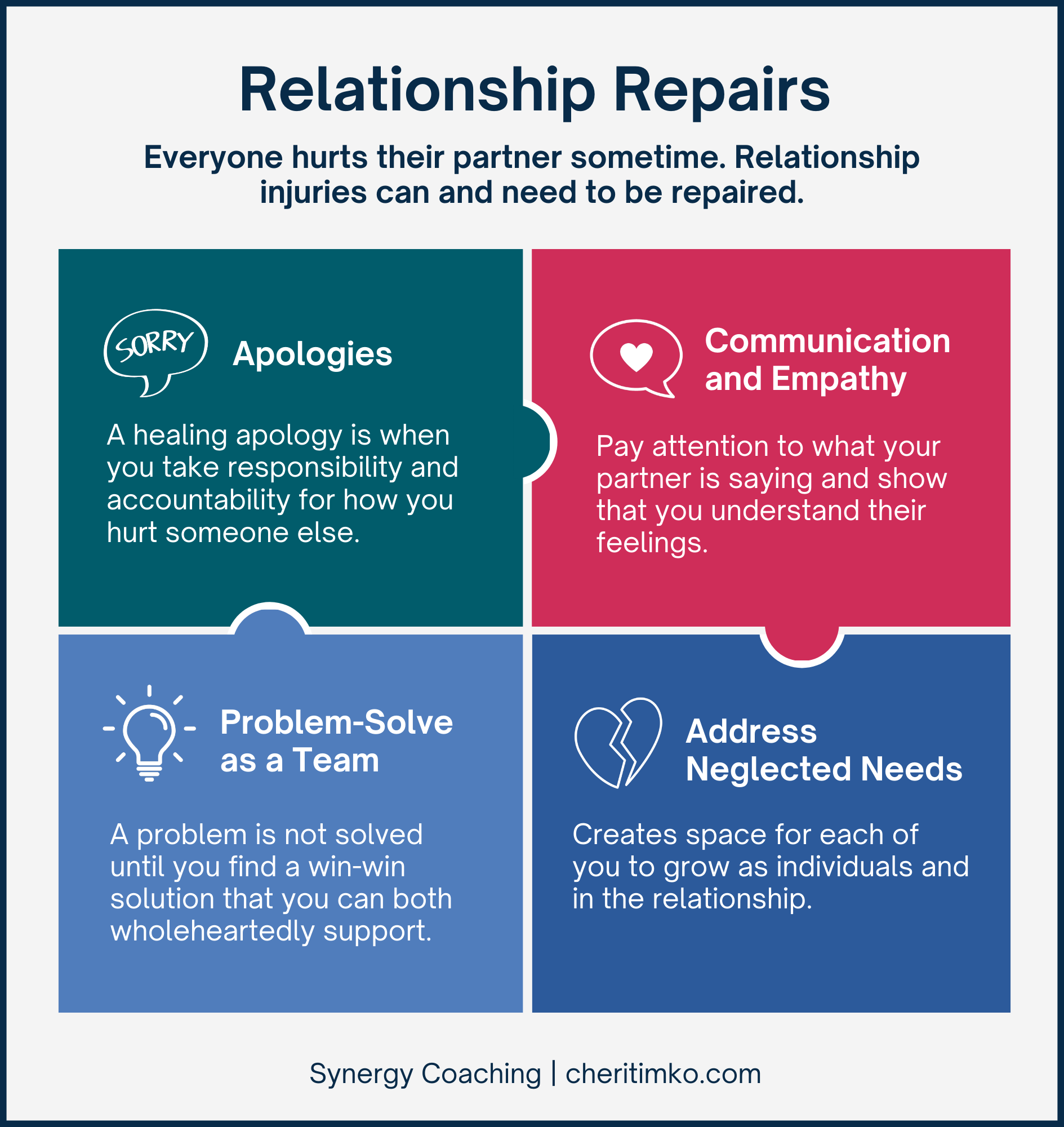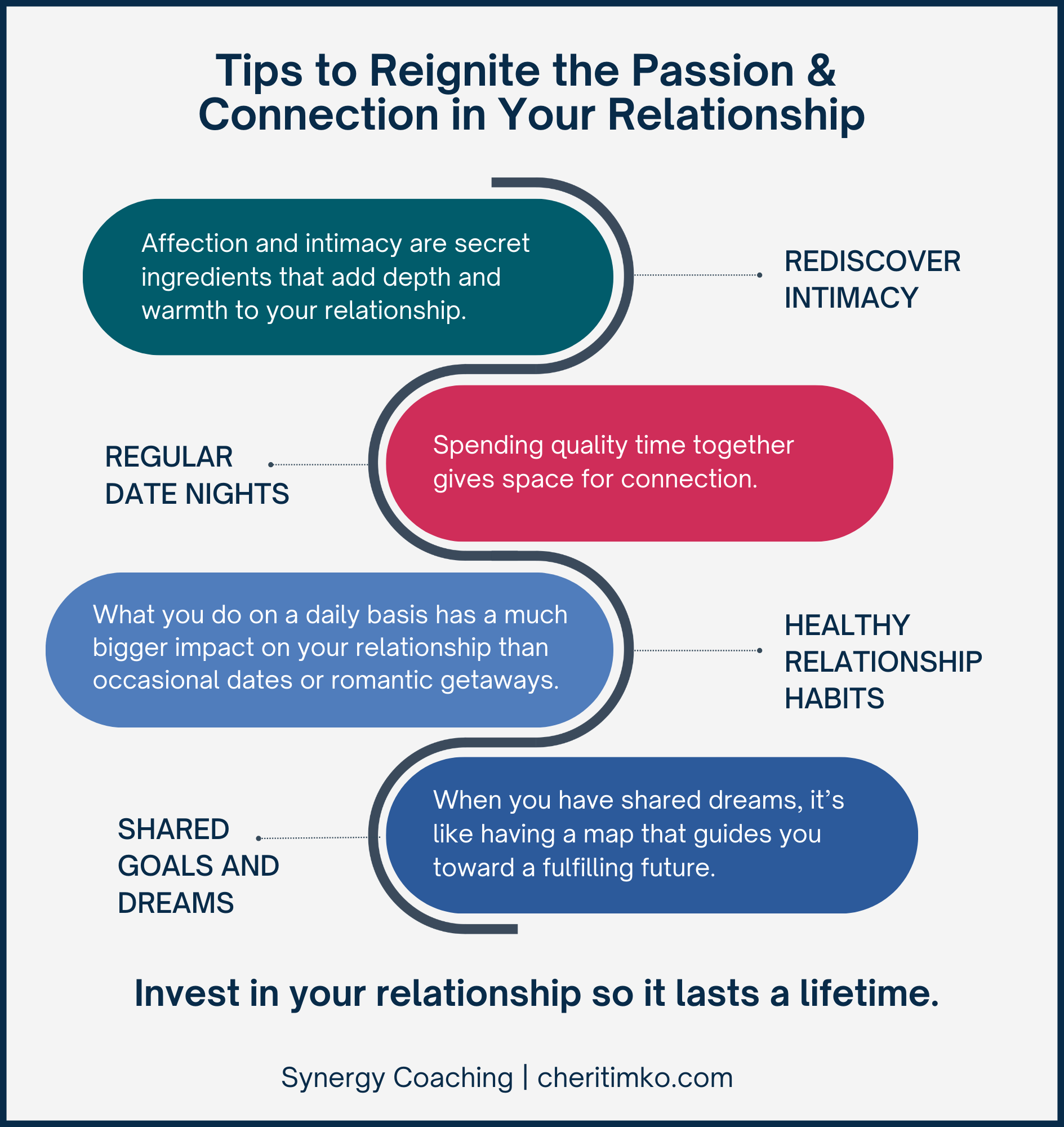Picture this: You’re sitting together on the couch, watching TV together. Although you’re in the same room, having the same experience, your partner feels miles away. There’s a noticeable gap between you. It’s a physical and emotional distance that’s hard to ignore. You yearn for the days when you would curl up together. But the thought of initiating such intimacy now seems daunting.
It’s not just during TV time. Even when you’re both home, you feel out of sync. You don’t talk and laugh together like you used to. Rather than engaging in meaningful discussions, you’re lost in separate digital worlds. When you find the courage to talk about your loneliness and disconnection, your partner dismisses it. You’re left with lingering doubts – is this all your relationship has become?
It’s a special kind of torment to feel lonely when you’re with the one you love.
There are moments when you catch glimpses of who you used to be as a couple. Those good times sustain you through the tougher times. After heartfelt conversations when you decide to “try harder,” things get better between you for a short while. You schedule dates or show each other more consideration. Occasionally, the stars spontaneously align, your eyes meet, and that spark reignites.
Inevitably, the relationship falls into a rut again.
Does this sound familiar? You’re not alone. Many couples cycle in and out of Roommate Syndrome. It’s when you feel more like roommates than the passionate lovers you once were.
When things are good in the relationship, you feel close. Your conversations are a dance of shared dreams peppered with laughter. When you’re in Roommate Syndrome, those moments are rare. You feel like you’re in different worlds. You live in the same house and talk about the logistics of work, family, and home. But you don’t have many meaningful, connecting conversations. The excitement fizzles.
Being in Roommate Syndrome feels lousy. You are either constantly watching for signs that your partner cares enough to engage with you OR you feel hopeless that things will ever change. So, you’ll have a heart-to-heart conversation and agree to work on the relationship. You’ll schedule some dates and promise to be more engaged. But within a short time, things get stale again.
Cycling in and out of Roommate Syndrome wears on both of you. When things are good, it’s hard to let your guard down. You’re waiting for Roommate Syndrome to strike again. When the familiar staleness sets in, you wonder if you chose the wrong partner.
The missed opportunities, disappointment, and loneliness create a wall between you. They block the deep connection you crave.
This cycle of disconnection is not inevitable. You can bridge the gap and renew the closeness you once experienced once and for all. It begins by understanding what’s happening and why, and then taking practical steps to fix it.
Isn’t it time to rekindle the love that makes your relationship extraordinary? If you’re ready to rekindle the flame, keep reading. In this article, you’ll discover:
- What Roommate Syndrome is.
- Its underlying causes and why it persists.
- Effective relationship repairs.
- Tools to reignite the passion and connection.
- How to cultivate a lasting and satisfying marriage.
What is Roommate Syndrome?
Imagine your relationship as a garden. Like a garden needs attention, your relationship needs care to thrive. Just as you’d water the plants or fertilize the soil, your relationship needs nurturing to flourish. Without that care, just like plants wither, your connection can grow distant. It’s a bit like facing slugs or a stubborn fungus – if you don’t address the issue, it can jeopardize your garden. Neglecting your relationship and allowing small hurts to accumulate will lead to relationship disconnection.

When long-term relationships lose their excitement, it’s called Roommate Syndrome. You stop feeling as close. You feel more like roommates living together instead of a loving couple. It’s a shift from sharing deep feelings and dreams to focusing on mundane daily tasks. The growing emotional distance leaves both of you feeling distant and disconnected.
As Roommate Syndrome sets in, you and your partner don’t talk as much about your feelings or your hopes for the future. It feels like you don’t know what they are thinking anymore.
Being in Roommate Syndrome sometimes feels okay–it feels comfortable and predictable. However, it’s dangerous to accept it as normal. When you do, you’re shortchanging both yourself and your partner, and it can impact your children too. The truth is, you can have an extraordinary relationship while still enjoying comfort and safety.
In the next section, we’ll talk about the truth behind Roommate Syndrome and why it tends to resurface. Just like a garden, you can choose which plants to plant, how much sun, rain, and fertilizer it gets, and prevent many of the common problems.
The Underlying Causes of Roommate Syndrome: why it persists
How many times have you had a heartfelt discussion, trying to fix the problems in your relationship? If you’ve been together for a while, you’ve likely lost count. These conversations often follow a familiar pattern:
- The small details start to slip in your relationship.
- You drop hints and make pointed comments.
- Nothing changes.
- Frustration mounts until one of you can’t take it anymore.
- You insist on a serious discussion where you both promise to “try harder.”
- The effort lasts for a few days or weeks.
- Before you know it, you’re right back where you started.
Here’s why:
Roommate Syndrome isn’t just about feeling distant and distracted. It’s also about the accumulation of seemingly insignificant negative interactions. Each time one of you feels let down by the other, there’s a little nick or papercut in your love. And as they accumulate, they create a disconnection between you. Over time, if these little relationship injuries go unaddressed, they build up.
This is precisely why “trying harder,” scheduling date nights, or escaping on romantic getaways aren’t enough.
You might think that simply spending time together or going on dates can resolve the problem. But Roommate Syndrome goes deeper than that. It’s about the unattended hurts and letdowns that occur during your day-to-day interactions. Each time you feel let down or disappointed by your partner, it’s like a crack forms in your relationship, causing emotional distance to widen. So, while dates are wonderful, they often fail to address the root issues.

1. Emotional Disconnect: As Roommate Syndrome takes hold, you and your partner gradually stop sharing your feelings and dreams. Conversations become more focused on tasks and daily details. The emotional bond that once held you together starts to weaken.
- Example: Imagine you’ve had a challenging day at work. In the past, you’d share all the details with your partner. But now, you keep those thoughts and feelings to yourself. Your partner, wrapped up in their own challenges, no longer asks about your day. Eventually, your response to the question, “How was your day?” becomes a simple “Fine.” You both miss countless opportunities to connect, creating a sense of isolation and emotional distance.
- Example: Think about a time when you and your partner used every conversation to share your dreams and desires. Now, those conversations are rare, and the intimate moments you used to enjoy together become fewer and farther between. Even when you’re in the same room, you feel lonely and disconnected. When you long for a deeper conversation, and your partner isn’t receptive, you feel like your partner is becoming a stranger.
2. Neglected Intimacy: As Roommate Syndrome takes hold, intimacy can slip away. You spend less time cuddling, holding hands, or sharing passionate moments. You begin to worry that your partner doesn’t find you attractive anymore. Differences in level of desire become more obvious. Sometimes you even wonder if you chose the wrong partner.
- Example: Remember when you couldn’t be in the same room without touching? If you can watch an entire movie while sitting on opposite ends of the couch, it can feel like your love has grown stale. Each of these missed opportunities can feel like a minor letdown.
3. Taking Each Other for Granted: In the hustle of daily life, you both manage various responsibilities for your family. Many of these activities go unnoticed or unacknowledged. You might assume your partner knows you love and appreciate them without needing to say it. Yet, this can lead you or your partner to feel invisible, unimportant, or unappreciated.
- Example: At the beginning, you used to surprise each other with small acts of kindness. Over time, those tasks disappeared into the background. You start to feel like your efforts aren’t recognized or don’t matter. This lack of appreciation can create emotional distance and hurt feelings.
- Example: When you first started dating, you thoughtfully shared the responsibilities for your lives. As you settled into the relationship, you each took on roles to make your lives run smoothly. Often, the workload becomes uneven. When one partner consistently picks up the unfinished tasks, it can breed resentment, further deteriorating the relationship.
4. Miscommunications: Clear communication is key in any relationship. Couples who have been together for a while often communicate in half-thoughts and half-sentences. They assume that their partner “knows what they mean.” In reality, even couples who know each other well misinterpret each other about half the time. Each miscommunication opens the door to irritation, agitation, bickering, and arguments. These slowly erode a relationship, creating more distance.
- Example: Recall a time when a simple miscommunication led to a heated argument. Instead of addressing the issue calmly, you both ended up frustrated and upset. These misunderstandings accumulate over time, creating a divide between you. You may begin to feel dismissed or bulldozed by your partner’s opinions.
Letdowns and disappointments become small wounds in your relationship. If you don’t address them, they fester and grow. They start small but can grow over time, causing pain and distance. Just like you’d clean and care for a cut to prevent infection, your relationship needs attention to heal.
Additionally, you may have had a major relationship injury. Examples include affairs, poor financial decisions, missing major events, or other ways of hurting one another deeply. These types of relationship injuries will continue to damage the relationship if they are not repaired. They often require work with a professional to heal the relationship and bring closure to them.
Understanding these types of letdowns is the first step in healing your relationship and bridging the emotional gap caused by Roommate Syndrome. In the next section, we’ll explore how to make repairs and start reconnecting with your partner. Just like treating wounds helps them heal, addressing these relationship letdowns can lead to a healthier and closer bond.
Relationship Repairs that Bridge the Gap in Roommate Syndrome
As you’ve discovered, Roommate Syndrome is the end result of a collection of small letdowns that build up over time. A primary path to breaking out of Roommate Syndrome is to repair your relationship by addressing these letdowns and hurts. Making repairs is like cleaning out the dust and cobwebs that have built up in your relationship. They are essential for rebuilding trust, connection, and closeness. When you work on making the repairs together, you kickstart the reconnection process.

1. Apologies: Apologies are like healing ointments for emotional wounds. Sincere apologies show that you care about the other person’s feelings and that you’re willing to make things right. It’s like putting a bandage on a cut to help it heal faster.
- Example: Imagine you said something that hurt your partner’s feelings. Apologizing sincerely makes your partner feel understood and cared for. It’s like saying, “I see you and value what’s important to you.”
- Example: You’ve been preoccupied by work and other stressors for a few weeks. Acknowledging your distractions, promising to make up for the lost time, and following through with your promises will make repairs for the lost time and attention.
2. Communication and Empathy: Listening to your partner is a special way of showing that you care. Active listening means paying attention to what your partner is saying and understanding their feelings. Being present in conversations bridges the emotional distance between you.
- Activity: To practice this, you can try a fun exercise called “mirroring.” It’s when one person talks and the other person repeats what they heard in their own words. This shows that you’re listening and helps your partner feel heard.
- Example: Your partner complains that they had a lousy day. You say, “It sounds like today didn’t go the way you hoped it would. That must have been exhausting.”
3. Problem-Solving as a Team: In any relationship, there will be problems. Some are obstacles to overcome; others are differences in the way you see things. When you work together to resolve them, it strengthens your bond. Teamwork helps you both overcome challenges and understand one another better. Remember, it’s not about one person winning; it’s about finding a solution that works for both of you.
- Example: Think of your relationship as a car stuck in the mud. Instead of pushing from opposite sides, both of you need to push together to get out of the mud.
4. Addressing Neglected Needs: Open discussions about what you both need from each other create space for each of you to grow as individuals and in the relationship. When you support each other in meeting these needs, it heals the little letdowns that contribute to Roommate Syndrome.
- Example: Use the “Relationship Wishlist” exercise. Take turns sharing what you’d like more of in the relationship. This can help you understand each other better and create a stronger connection. Keep the discussion positive.
These are just a handful of a longer list of repairs. Learning the repairs that have the biggest impact on your relationship gives you a roadmap to use in the future.
When you make repairs to the relationship, you take the first step in breaking down the barriers created by the letdowns that led to Roommate Syndrome. Just like cleaning out your closet makes space for new things, making repairs clears space for a renewed connection.
In the next section, we’ll look at the ways you to reignite the passion and intimacy that will help your relationship blossom once again. Remember, by addressing these small hurts, you’ve laid the foundation for a stronger, longer-lasting, and more fulfilling connection with your partner.
Reigniting Passion and Connection
Now that you’ve started making repairs and cleaning out the relationship injuries of Roommate Syndrome, the other commonly used strategies for reconnecting will have room to blossom. Just like a garden needs ongoing care to thrive, your relationship requires active nurturing to flourish. Let’s dive into ways to reignite the passion and connection that can make your relationship stronger than ever.

1. Rediscovering Intimacy: Intimacy is a secret ingredient that adds depth and warmth to your relationship. To reignite it, start by spending quality time together. Engage in activities that encourage deep conversations, emotional sharing, and physical closeness.
- Practical Tip: Set aside time each week for an intimate conversation. During this time, focus solely on each other, share your thoughts and feelings, and listen attentively.
- Creative Idea: Write a love letter to your partner. In it, express your emotions and reminisce about cherished memories you’ve shared. It’s like giving them a piece of your heart on paper.
2. Regular Date Nights: Date nights are the special occasions that light up your relationship. Regular, quality time together is like adding water to your relationship garden. These nights aren’t just about the activity; they’re about enjoying time together. The key is consistency – just like plants need regular watering. Invite your partner to a fun activity so they feel chosen and prioritized.
- Practical Tip: Set a specific day each week for your date night. This creates a routine that you both can look forward to.
- Date Night Ideas: Whether it’s cooking a new recipe together, taking a leisurely walk, having a picnic in the park, or even watching a movie at home, find activities that you both enjoy. The key is to create an environment where you can connect without distractions.
3. Shared Goals and Dreams: Setting goals and aspirations as a couple is like planting seeds for a shared future. When you have shared dreams, it’s like having a map that guides you toward a fulfilling future. Encourage each other to dream big and support one another in reaching those dreams.
- Practical Tip: Sit down with your partner and discuss your individual and shared goals. Write them down and create a plan to work toward them together. Meet regularly to track your progress
- Practical Tip: Style matters. Some couples accomplish more by working as a team. Others work better when they divide and conquer. Practice what works best for each of you, not how others think you should do things.
4. Healthy Relationship Habits: It’s tempting to wait for an epic date night or romantic getaway to work on the relationship. What you do on a daily basis has a much bigger impact on your relationship than the things you do every now and then. Practice healthy relationship habits that build the connection a drip at a time.
- Practical Tip: There are many ways to build connection into your day as a healthy habit. Examples include drinking a cup of coffee together while talking about your day, eating a meal together, greeting each other at the end of the work day, and snuggling before bed. The best habits fit easily into your day and are activities you both enjoy.
By nurturing your relationship through intimacy, regular date nights, shared aspirations, and relationship habits, you’re adding vibrant colors back into the canvas of your partnership. The small steps you take now are like the water and fertilizer that will make your relationship flourish. Remember, just as a garden thrives with care and attention, so does your relationship when you invest in it with love and effort.
Cultivating a Lasting, Satisfying Marriage
Congratulations! You’ve taken the steps to heal your relationship from the grasp of Roommate Syndrome and reignite the passion that was once the heartbeat of your partnership. But remember, just as a garden needs ongoing care, your relationship requires effort to thrive and flourish. Here are a few final thoughts.
Ongoing Effort for a Fulfilling Marriage: Your marriage is a living entity that needs constant nourishment. The love and connection you’ve rebuilt need consistent attention. It’s like tending to a garden throughout the seasons – your relationship grows and changes, and you need to adapt and nurture it accordingly.
Embracing Setbacks as Part of the Journey: In any journey, there will be bumps along the way. Setbacks are like weeds in a garden – they might pop up, but you have the tools to manage them. Setbacks are normal, and they don’t define the whole journey. By addressing them earlier together, you strengthen your bond even more.
Marriage as a Precious Garden: Picture your marriage as a garden that flourishes when it’s cared for. Just as you’ve taken the time to heal and nurture your relationship, the fruits of your effort will blossom into a fulfilling and satisfying partnership. Every act of love and every shared moment is like sunlight and water that help your love story grow.
Staying Committed, Even in Challenges: Challenges are like storms that might pass through your garden. Just as a garden withstands rain and wind, your relationship can weather the challenges. The commitment you have for each other is the strong root that holds you steady. Remember, commitment means standing by each other, even when the skies are gray.
Conclusion
You’ve embarked on a transformative journey from Roommate Syndrome to a love that’s more vibrant and deep than ever before. You’ve recognized the letdowns, made repairs, and nurtured the connection. Your relationship has blossomed, much like a garden in full bloom.
As you continue to nurture your love, know that every step you take is an investment in your happiness. The path you’ve chosen is not just about fixing what’s broken; it’s about creating something stronger and more beautiful. The love you share is precious, and by caring for it, you’re ensuring that it remains a source of joy and strength for years to come.
So, take this renewed passion, this rekindled connection, and let it be the foundation of the lasting, satisfying marriage you deserve. Your love story is a masterpiece, and the canvas is yours to paint.
Embark on this transformative journey and watch your relationship flourish.
If you would like support, encouragement, inspiration, and ideas, join us in the Facebook Date Night Community!
